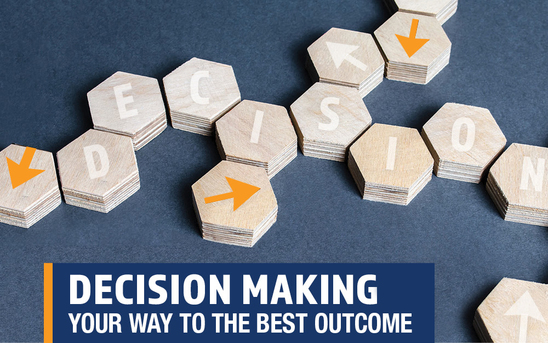Decision making your way to the best outcome

Throughout our lives, making a decision is something we do thousands of times a day. Our first thought occurs as soon as we wake, and our final thought when we drift off to sleep. Researchers have found on average, that most people will have approximately 6,200 thoughts per day.i
Having so many thoughts requires us to make thousands of decisions. Whilst majority of these decisions are simple and will have no significant consequence, there are times when more difficult and complex decisions will need to be made and require creative thinking techniques and a deeper thought process to ensure a more successful outcome.
Deep thinking vs shallow thinking
Two types of methods can be used when it comes to decision-making and while neither is right nor wrong, it’s important to understand the difference between the two and choose the method that works best for you and the situation. After all, if we all thought the same way, life would be pretty boring right?
Deep thinking requires effort and mindfulness and someone who is considered a deep thinker will usually look at the whole chain of events throughout this thought process. They will explore different pathways to reach different outcomes and have a greater understanding of the consequences based on that specific decision.
Contrary to deep thinking is shallow thinking, and these decisions are instinct-driven – they are made immediately. This type of thinker is decisive and won’t necessarily spend time exploring different pathways to reach an outcome or consider the consequences of their decisions as much as a deep thinker would.
Can you learn to become a deep thinker?
Some may say, with so much technology and information on hand, shallow thinking is now far outweighing the deep thought process and we are losing the ability to use these creative thinking skills to make certain choices. Our attention span is limited; we are distracted easily, therefore our thought process is constantly being interrupted, meaning we spend less time thinking about the outcomes of the choices we are making.
There are several steps you can implement to learn how to become a deep thinker. Firstly, you must fully understand the situation in detail – what is being asked and what impact it will have – only then, can you spend time creating a constructive environment to make decisions. In creating a constructive environment, you will need to determine whether other people should be included in this process.
By including others, you have the opportunity to take into account other people’s ideas. This is a fantastic way to explore ideas that you may not have previously considered and give the process the time and attention it deserves. Once you have reviewed all options, you can determine the risks and impacts of each, then decide what the best outcome is likely to be.
Alternate ways to make decisions
Some decisions won’t be as complex or require the same level of creative thinking to make the right choice. Some alternate options could be as simple as – sleep on it. While this may seem like a ‘no brainer’, this can be one of the most effective ways to make a decision. While you are sleeping, your subconscious is still hard at work.
Talk to friends, relatives, or colleagues whose opinion you value – they can offer a different perspective if you are unsure about your decision.
Schedule a specific time in the day to help you focus – do you do your best thinking in the morning, afternoon, or evening. Remember, to focus completely, you need to remove all distractions during this time – turn off your email notifications and put your phone on silent.
If the decision is work-related, try delegating tasks as this could help reduce stress if work is piling up.
Change your environment – going for a walk or meditating can help you relax which then allows you to free space in your mind and shed new light on the way you think.
No right or wrong
Remember, there is no right or wrong when it comes to making decisions. Whether they are personal or business-focused, by applying some of these methods, you may alleviate stress and reach a better outcome when you next make a decision.
i https://www.newshub.co.nz/home/lifestyle/2020/07/new-study-reveals-just-how-many-thoughts-we-have-each-day.html
Material contained in this publication is a summary only and is based on information believed to be reliable and received from sources within the market. It is not the intention of RGM Financial Planners Pty Ltd ABN 36 419 582 Australian Financial Services Licence Number 229471, RGM Accountants & Advisors Pty Ltd ABN 69 528 723 510 that this publication be used as the primary source of readers’ information but as an adjunct to their own resources and training. No representation is given, warranty made or responsibility taken as to the accuracy, timeliness or completeness of any information or recommendation contained in this publication and RGM and its related bodies corporate will not be liable to the reader in contract or tort (including for negligence) or otherwise for any loss or damage arising as a result of the reader relying on any such information or recommendation (except in so far as any statutory liability cannot be excluded).
Liability limited by a scheme approved under Professional Standards Legislation.
